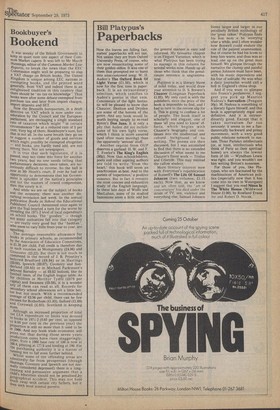Bookbuyer's
Bookend
It was sneaky of the British Government to keep so quiet over one aspect of their Common Market capers. It was left to Mr March Hunnings, editor of the Common Market Lou' Reports, to break the news that the EEC Commission might well be preparing to slap a VAT charge on British books. The United Kingdom is unique among EEC nations in exempting books, and the printed word generally, from VAT and indeed there is an enlightened tradition in this country that there should be ' no tax on knowledge'. Thus books were after some debate exempted from purchase tax and later from import charges, irnPort deposits and SET. Now the Brussells bureaucrats, in a draft directive on VAT which is now under consideration by the Council and the European parliament, are envisaging a single standard rate of taxation which might " in certain circumstances " be at a reduced rate of 5 per cent. Very big of them, Bookbuyer's sure, but that is not all. In the same breath they go on to suggest a number of goods and services Which might possibly be exempted altogether — and books, one hardly need add, are not among them. Nor are newspapers. It is true that such legislation, if it is Passed, may not come into force for another two years, but no one needs telling that Parliamentary decisions, once taken, are notoriously difficult to reverse, So the ball is now in Mr Heath's court. If ever he had an oPportunity to demonstrate that his Government is upholder of the nation's principles and not the masters of cowed compromise. then this surely is it. And while we are on the subject of books and the economy, there was another disturbing revelation last week. In the annual Publication Books in School the Educational Publishers Council threatened once again to give the Trail-hearted a turn for the worse by revealing the 1971-2 level of local expenditure on school books. The ' goodies ' — though not many authorities fall into that category — are really very good but the ' baddies Who seem to vary little from year to year, are appalling.
The average reasonable allowance for books in primary schools, as recommended by the Association of Education Committees, iS £1.38 per child. Full credit is therefore due to such counties as Montgomery (C4.06) and Gloucester (£3.22). But there is not much to commend in the record of .1. B. Priestley's beloved Bradford (£0.94) or in Hastings (£0.88), Ipswich (£0.87), Coventry and Sunderland (£0.85) or in Michael Parkinson's beloved Barnsley — at £0.82 bottom, like its football team, of the English league table. As for children in Merthyr Tydfil (£079 per capita) and Swansea (E0.59), it is a wonder any of them can read at all. Records for secondary school allowances are a little better but not much. With a recommended average of £3.56 per child, there can be few excuses for Rotherham (£1.83), Salford (e1.89)
and Cornwall (C.93). Scotland is keeping mum,
Although an increased proportion of total net LEA expenditure on books was devoted to books in 1971-2 (0.85 per cent, as opposed 10 0.80 per cent in the previous year) the Proportion is stilt no more than it used to be in 1966. And any book trade economist will Point out that during those seven years Production coats have risen staggeringly; PaPer, from a 1966 base rate of 100 is now at 188-4, printing at 177.9 and binding at 180. For the purchasing authority it is a matter of running not to fall even further behind. Whilst sonie of the offending areas are admittedly far from prosperous (though liastings, Coventry and Ipswich are not norMalty considered depressed) there is a longrunning and persuasive argument that a Child's education should not be penalised by Eeographical accident. This may not hold much sway with certain city fathers, but it does with most normal parents.










































 Previous page
Previous page